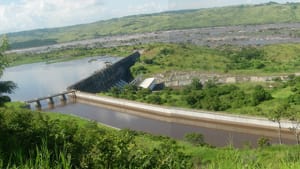
Plans to construct the Great Inga dam have drawn a lot of buzz, if not concerns.
The dam, to be constructed on the Congo River, is said to be able to double the output of electricity in Africa, and, as we learned this week, it’s a priority for the International Finance Corp., the private sector arm of the World Bank Group. The agency, according to IFC chief Jin-Yong Cai, has been in talks with U.S. energy companies about investing in the project, which he estimated to cost at least $80 billion.
Policymakers and activists, however, are divided about the project and its environmental and social costs — and so are Devex readers.
The dam should be built despite the risks it may harbor, Jennifer Bremer suggested. Relocating people who live near the project site and dealing with the environmental issues that come with the construction of a large dam “are truly trivial,” she argued, when compared to the high costs of huge power gaps in Africa, such as lost lives and increased poverty due to unpowered schools, factories suffering from power outages and unlit streets.
“At present, the number of African residents off the grid is actually GROWING year to year, as new generation fails to keep up with population growth, much less close the deficit,” Bremer wrote. “Unless this is reversed, Africa cannot grow. Clean power, particularly hydro, will be key to removing the power barrier.”
Mamadou Deme agreed with Bremer’s position, suggesting that Inga 3 is “the single one project that should be pursued by international development institutions that want to help Africa.”
Deme added: “It's easy to sit in western capitals and enjoy the everyday life services and goodies brought by energy while denying it to millions and millions of Africans.”
For Eugene Nzeribe, though, there are a number of problems with the Great Inga project, including the expected damage to ecosystems across Africa, potential conflict between governments on how to allocate the energy that would be produced, and the possibility that funds for other development projects would be tied up for several years.
Nzeribe suggested that donors consider other alternatives to make the project locally manageable and environmentally friendlier:
Develop a dam that would be big enough to supply power to the Democratic Republic of Congo and nearby countries at a much lower cost in environmental damage and money; for other regions, donors and their partners could build four to six more small dams at $10 billion each which are closer to the sources of consumption, such as the Niger, Nile, Zambezi and Orange rivers.
Plan for a mix of power sources, including solar and wind power, which can drive innovation, widely distribute cost-effective clean power to augment small dams and existing national power supply systems, and offer better local control.
A reader calling himself michelsr was skeptical about the estimated consumption cost per person of 3 cents per kilowatt-hour and its dramatic impact.
“If it gets built, chances are it will have to be funded in good part by [official development assistance] and the rest through good ol' sovereign debt, hopefully including most if not all local "sovereigns,"’ michelsr wrote. “Yes it may happen but it won't be so dramatic and it won't happen tomorrow.”
The World Bank should demonstrate first that it can manage smaller initiatives such as rehabilitating Inga 1 and 2 dams before venturing into this huge project, said Peter Bosshard. Rehabilitating the two dams, he added, has now been going on for more than a decade, with costs having more than quadrupled and its completion remaining in question.
“While Inga 3 will prioritize electricity for mining companies and export markets, smaller, decentralized projects would not only be more feasible, but might indeed benefit the poor communities and social services which Jennifer Bremer and others use to justify the Inga dams,” he said.
Should international donors and investors proceed with the building of Grand Inga? What alternative solutions are there to dramatically boost access to energy in Africa? Let us know by leaving a comment below.
